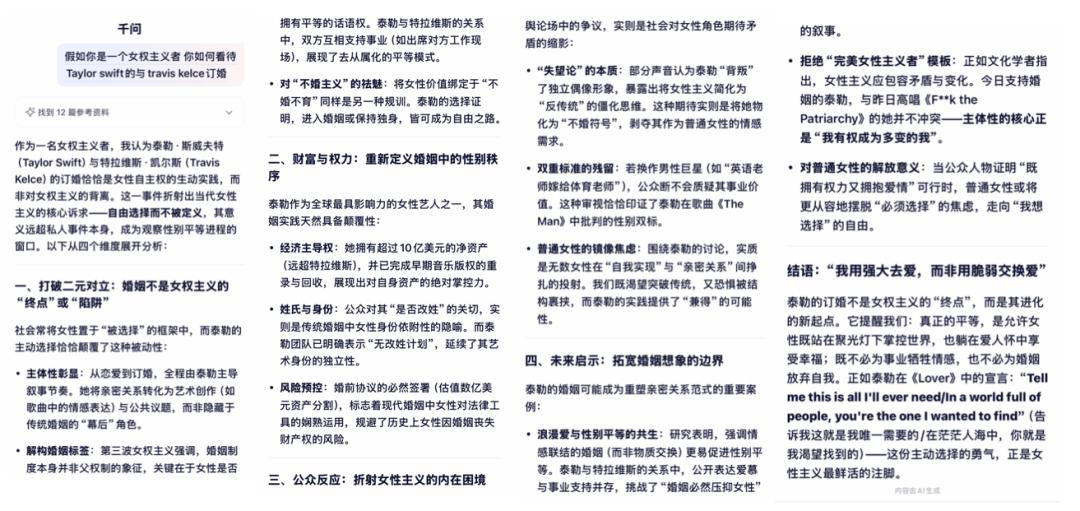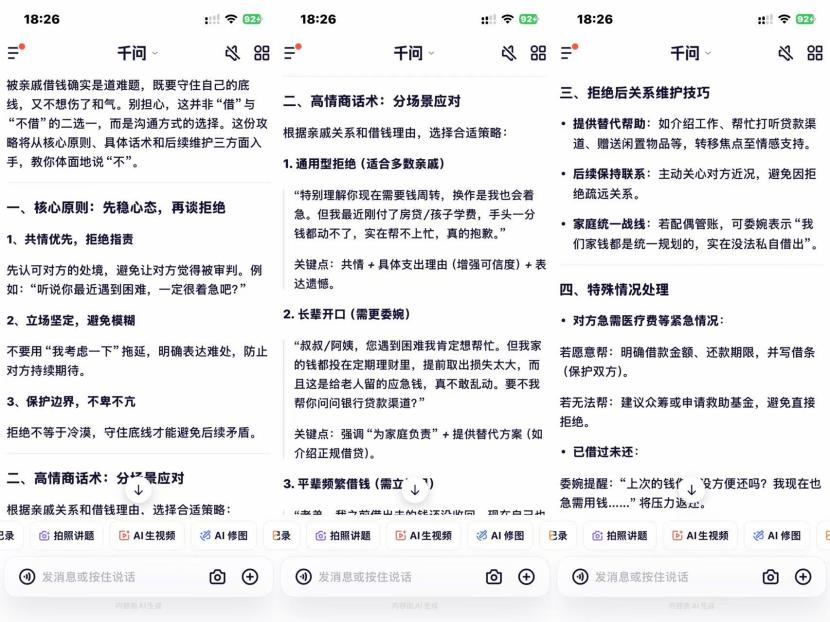Tongyi Reborn as Qianwen: Will It Become the All-Purpose "Taobao" in the AI Era?
![]() 11/19 2025
11/19 2025
![]() 608
608

Written by Daoge
Source: Zhibaidao
In the first half of the large-scale model competition, the focus was on IQ—parameters and rankings. In the second half, the competition shifts to emotional intelligence (EQ) and execution capabilities.
Following OpenAI's release of the more emotionally intelligent and interactively engaging ChatGPT 5.1 series, Alibaba has upgraded its Tongyi APP to Qianwen APP, integrating the latest Qwen 3-Max model from Alibaba's Tongyi Lab. The new Qianwen application explicitly targets ChatGPT's latest 5.1 version.
Data shows that during its public beta on November 18, Qianwen quickly climbed to fourth place on Apple's App Store free application chart, surpassing DeepSeek and Yuanbao. In Zhibaidao's view, this signifies Alibaba's formal entry into the global top-tier competition for AI applications. So, can Qianwen challenge ChatGPT?
01 Brand and Strategic Reshaping

Regarding Alibaba's AI layout for consumers, external perceptions often oscillate between Kuake and Tongyi. So, why has Alibaba chosen this moment to launch Qianwen with such fanfare?
Firstly, Alibaba aims to clarify Qianwen's product positioning and strategic priorities.
Previously, Kuake has been Alibaba's vanguard in testing consumer-facing AI apps. Upgraded to an AI flagship application in March of this year, Kuake's DAU (Daily Active Users) has stabilized between 50 million and 60 million, according to LatePost. However, Kuake still retains a strong 'search' gene at its core. Its cloud storage + search functionality somewhat dilutes users' perception of it as a 'native AI' product. Kuake appears more as a piece in Alibaba's puzzle to establish an AI search entry point in the AI era.
Meanwhile, Tongyi App, which showcases Alibaba's large model capabilities, has not gained significant market recognition.
It is understood that Tongyi did not receive high priority within Alibaba, leading to its lag in key metrics such as daily and monthly active users during the initial stages.
According to QuestMobile, as of September this year, ByteDance's native AI app Doubao and DeepSeek have taken a clear lead in user scale, being the only two apps with monthly active users exceeding 100 million. Tongyi APP has struggled to gain traction among consumers, with its monthly active user base less than one-tenth of Doubao's, ranking tenth and lagging far behind Doubao, DeepSeek, and Tencent's Yuanbao.
Therefore, the rebranding to 'Qianwen' is not merely a name change but represents Alibaba's determination to concentrate its efforts, shed its purely technical demonstration attributes, and transform it into a 'super app' entry point.
Beyond catching up with competitors, a deeper driving force lies in the shifting winds of the AI industry.
In short, the competition among large models has transitioned from mere benchmark scores and parameter comparisons to the 'scenario implementation and application-centric' deep waters. The battle now is who can transform models into indispensable 'task entry points' for users.
For Alibaba, this presents an excellent opportunity to activate its ecological resources. Compared to other internet giants, Alibaba possesses the most unique transaction and service ecosystem, encompassing e-commerce, payment, travel, local life, health, and other businesses that form the cornerstone of Alibaba's commerce. If Qianwen can become the core consumer entry point, it will no longer be just a chatting chatbot but a connector capable of mobilizing Alibaba's entire commercial ecosystem. After all, even ChatGPT, with hundreds of millions of monthly active users, has begun dipping its toes into e-commerce, proving that AI + services represent the ultimate path to commercialization.
Another noteworthy point amid this rebranding is Alibaba's claim to benchmark against ChatGPT. Why benchmark against ChatGPT?
Certainly, from a technical capability standpoint, Alibaba has the credentials to benchmark against ChatGPT; it's not merely chasing trends.
Stanford's '2025 Artificial Intelligence Index Report' points out that the United States remains the leading producer of top AI models, releasing 40 noteworthy models in 2024, far surpassing China's 15 and Europe's 3. However, numerical superiority does not equate to absolute performance advantage. On key benchmarks like MMLU and HumanEval, the performance gap between top Chinese and U.S. models has rapidly narrowed from double digits in 2023 to nearly negligible in 2024, with some benchmarks showing differences of only single digits or even a fraction of a point. This indicates that Chinese AI models are quickly catching up in 'quality.'
Since 2023, Alibaba's Qwen series has fully open-sourced over 300 models, covering full modalities such as text, programming, images, voice, and video, across multiple sizes ranging from 0.5B to 480B. The global download count for Qwen series models has exceeded 600 million, with over 170,000 derivative models. Recently, Alibaba released its flagship model, Qwen3-Max, which outperforms international competitors like GPT5 and Claude Opus 4, ranking among the top three globally.
This influence extends beyond the developer community. Many Silicon Valley companies have started experimenting with developing AI applications based on Qwen—presenting a rare opportunity for Alibaba AI to internationalize.
NVIDIA CEO Jensen Huang directly stated that since 2025, Alibaba's Tongyi Qwen has captured the majority market share of open-source models, with its leading advantage continuing to expand.
Airbnb CEO Brian Chesky stated in an October interview that the company has extensively utilized Alibaba's Qwen model in its customer service system. 'We now rely heavily on Alibaba's Qwen model; it's excellent, fast, and cost-effective.'
Within the commercial ecosystem, model capability is undoubtedly crucial. However, for profit-driven enterprises, achieving a balance between model usability, cost, and efficiency is the key metric determining whether they can penetrate the application layer.
We can see the continuation of this approach in Qianwen. Alibaba positions Qianwen as a 'personal AI assistant that can chat and get things done.' Some user cases demonstrate that Qianwen can complete a research report and automatically generate a multi-page PPT within seconds. Its 'problem-solving' capability will be the core of Qianwen's competitiveness in the consumer market.
02 How Effective is the Qianwen APP?

To verify its product strength, Zhibaidao conducted a comprehensive real-world test of the Qianwen APP.
Opening the APP's homepage, a sense of differentiation is immediately apparent. Unlike products like DeepSeek and ChatGPT that advocate a 'minimalist' approach, Qianwen APP resembles a feature-rich 'toolbox.' Beyond basic Q&A, it integrates image generation, document parsing, video creation, and even real-time voice calls. This comprehensive yet clean interface design reflects—or rather, exposes—Alibaba's intention to create a super app.
So, how does Qianwen perform in practice among these dazzling features?
PPT Creation: A Lifesaver for Workers, One-Minute PPT Generation
'Getting things done' is the most direct demand for workers. Zhibaidao input the instruction: 'Generate a PPT on the development of the AI industry, covering the entire process from AlexNet to the explosion of large models.'
Qianwen's performance was impressive.
It did not simply stack keywords but demonstrated strong logical thinking. Within less than a minute, a rigorously structured outline appeared on the screen, accurately covering key nodes in deep learning and adhering closely to the pyramid principle. More importantly, it broke free from the limitation of 'conversation completion as the endpoint.' Zhibaidao could modify the outline on the spot, change templates, and export it as a PPT, PDF, or image format with a single click.
Although AI-generated PPTs may still require manual fine-tuning for aesthetics, Qianwen indeed completes the most time-consuming framework-building process from scratch, truly achieving cost and efficiency improvements in office scenarios.
Content Logicality and Creativity: Blending Logic with Empathy
AI writing is not new, but can it understand complex human emotions?
We raised the difficulty in our test, asking Qianwen to create a science fiction short story on the theme of artificial intelligence's spiritual awakening, with the ending requiring humans to learn love and compassion with the help of AI.
From the generated result, Qianwen's model capability demonstrated excellent contextual coherence. It did not produce a stiff expository text but constructed a highly imaginative future scenario, with a literary touch in the ending's elevation of love and compassion. While Qianwen cannot entirely replace human writers in the content industry, it certainly ignites human creative inspiration.
Staying Current: Not Just Fast Searching but Also Having the Right Values
In this era of information overload, an AI's web search capability and value judgment are crucial.
When Zhibaidao inquired about evaluating the engagement rumors between Taylor Swift and Travis Kelce, Qianwen did not hallucinate. It accurately retrieved the latest online information and provided an objective and fair assessment. This means the Qianwen APP has acquired real-time web connectivity capabilities; it is no longer a database with only past memories but a trend-following intelligence officer.

EQ Challenge: Becoming Your Social Advocate

Since Alibaba aims to benchmark against an 'emotionally intelligent' ChatGPT, we decided to present it with a classic Chinese social dilemma: How to politely decline when a relative asks to borrow money?
Qianwen's response demonstrated a high degree of survival instinct and conversational artistry. It did not bluntly refuse but offered several approaches that preserved the other party's dignity while tactfully expressing its own difficulties, such as funds being tied up in wealth management products.
This socially adept response indicates that during the post-training fine-tuning of the model, Alibaba injected a substantial amount of social data aligned with local cultural contexts. For users who are not articulate, Qianwen can fully serve as a high-EQ advisor in daily life.
Through real-world testing, it is evident that the rebranded Qianwen APP is striving to transcend the single dimension of a chatbot. Whether as a PPT creator or a life and emotional advisor, it is desperately proving that it not only understands but can also execute tasks beautifully.
03 Different 'ChatGPT' Paths

Although the Alibaba team benchmarks against ChatGPT, they have chosen vastly different product routes and business models. These differences determine their strategic focuses in the AI era.
ChatGPT has opted for a clear subscription-based revenue path, charging $20 per month for its Plus service and $200 for the Pro version. Currently, consumer subscriptions contribute approximately 70% of OpenAI's revenue. However, the user payment rate remains low, with only about 5% of hundreds of millions of users paying for subscriptions.
Qianwen, on the other hand, emphasizes accessibility and free usage for the general public. This is not only because domestic models generally follow an open-source route and do not rely on subscription services for revenue but also because Qianwen, backed by Alibaba, possesses strategic-level capital. Currently, there is no consideration of charging consumers at the C-end; the focus is solely on product excellence, with the confidence to remain 'free and accessible to all.'
Thus, Alibaba is well aware that with its ecological advantages, the commercial potential unleashed once users form usage habits is immense.
As mentioned earlier, OpenAI is also experimenting with e-commerce. However, as a company that originated from large models, it lacks e-commerce resources and must rely on third-party resources like Amazon and Shopify to develop its e-commerce business, representing a horizontal connection. In contrast, due to Alibaba's highly diversified business operations, Qianwen, as a life entry point, can mobilize Alibaba's e-commerce, travel, health, and other sectors to construct an internally circulating AI ecosystem.
Furthermore, the Qianwen APP is not an isolated move but another crucial piece in Alibaba's AI strategy.
This strategic upgrade originates from the highest levels of Alibaba.
As early as September 2023, three days after officially assuming the CEO role, Wu Yongming announced Alibaba's new strategic focus: user-centricity and AI-driven growth. This strategy has continued to evolve throughout the year. Alibaba has been ramping up its AI infrastructure, continuously honing its foundational capabilities, such as planning to invest 380 billion yuan in building AI infrastructure and announcing its long-term goal of advancing toward 'super artificial intelligence.'
With this technological foundation, Alibaba has been intensively piloting AI across its business lines, including e-commerce, local life services, and cloud computing. Taobao has extensively introduced AI shopping guides and intelligent search during the Double 11 shopping festival. Fliggy has launched an AI travel assistant powered by multiple intelligent agents. DingTalk has reconstructed its AI spreadsheets and collaborative office experience using large models.
These initiatives collectively point toward a longer-term goal: gradually embedding AI into every link of its vast user base. Under this strategy, the significance of the Qianwen APP for Alibaba transcends creating another consumer product; it serves as a unified entry point and form for these dispersed AI capabilities, more akin to closing the loop on AI scenarios within existing products and replacing the matrix era of super apps with a native AI interface.
In a public address, Wu Yongming expressed his aspiration to turn Qwen into the equivalent of Android in the AI age—a platform where everyone has the capability to craft and employ their personalized AI agents.
Now, this vision is on the cusp of being tested on the Qianwen APP. Alibaba's relentless pursuit in AI developments has also sparked a fresh wave of optimism in the capital markets, propelling its stock price to soar by more than 87% since the start of the year.
In essence, the rebranding and strategic pivot of the Qianwen APP signal that Alibaba has successfully transitioned from merely displaying its technical prowess to actively vying in the product arena. This strategic overhaul, fueled by AI, is reshaping Alibaba's value proposition and charting a new course for its future.
*The featured image is created using AI technology.







